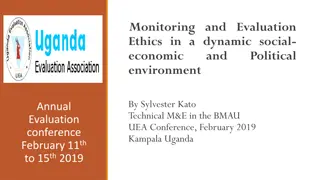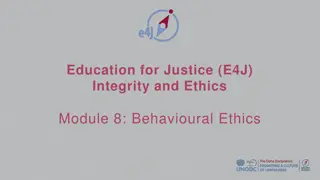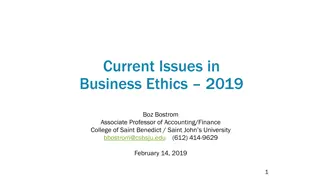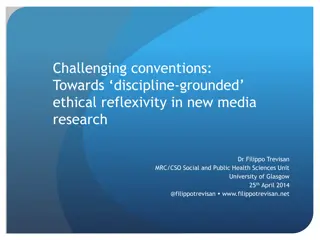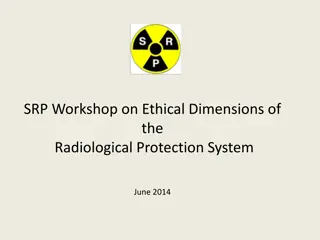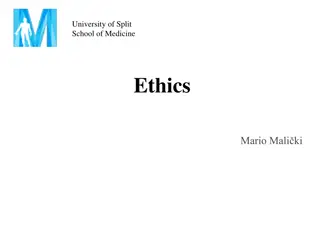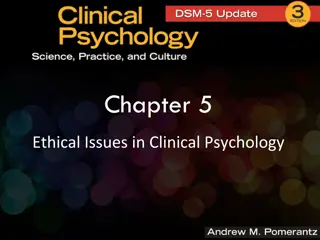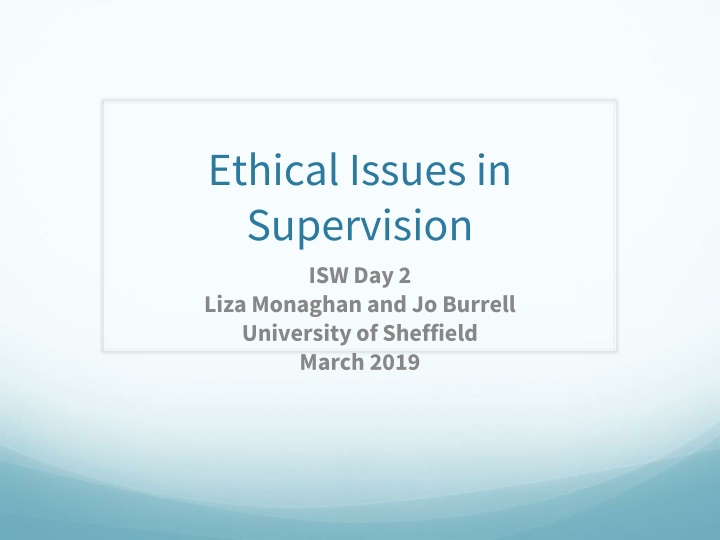
Ethical Issues in Supervision - Exploring Philosophical Ideas and Challenges
Delve into the complexities of ethical issues in supervision, examining philosophical concepts, challenges of ethical practice, and applying principles in real-world scenarios. Explore the importance of ethics and its implications in professional settings.
Download Presentation

Please find below an Image/Link to download the presentation.
The content on the website is provided AS IS for your information and personal use only. It may not be sold, licensed, or shared on other websites without obtaining consent from the author. If you encounter any issues during the download, it is possible that the publisher has removed the file from their server.
You are allowed to download the files provided on this website for personal or commercial use, subject to the condition that they are used lawfully. All files are the property of their respective owners.
The content on the website is provided AS IS for your information and personal use only. It may not be sold, licensed, or shared on other websites without obtaining consent from the author.
E N D
Presentation Transcript
Ethical Issues in Supervision ISW Day 2 Liza Monaghan and Jo Burrell University of Sheffield March 2019
Aims for the session Contextualise the discussion of ethics -the value of seeing the whole picture . To discuss relevant philosophical/conceptual ideas To discuss challenges of ethical practice (in supervision) To apply principles in practice
Of course, indifference can be tempting -more than that seductive. It is so much easier to look away. It is so much easier to avoid such rude interruptions to our work, our dreams, our hopes. It is after all, awkward, troublesome, to be involved in another person s pain and despair. Yet for the person who is indifferent, his or her neighbours are of no consequence. And therefore their lives are meaningless. Elie Wiesel taken from Barker (2011) Mental Health Ethics: The Human Context . (p5)
Exercise 1 What does being ethical/unethical mean to you? Discuss in pairs and feedback https://youtu.be/_SsccRkLLzU https://youtu.be/vDGrfhJH1P4
Thinking about ethics and supervisory practice (taken from Scaife 2009) An ethical framework is like scaffolding around action made up of moral philosophy, professional codes of behaviour, values inherent in the therapeutic models, personal ethics, the law, organisational context (Bond, 2008) General principles of ethical decision making- moral philosophical underpinnings. Kant absolute duty Consequentialist theories Virtue theory Adopted by medicine - developed in 1920 s/ 30 s led to a framework of a professional community guiding their own professional action. However BRI scandal, Shipman, Liverpool Cancer Care Pathway, suggest the complexities.
The Francis Report 2010/2013 The Mid Staffs Public Inquiry Evidence of extreme patient suffering. Trust Board primarily held to account. However, nursing and medicine also mentioned NHS system of checks and balances did not prevent serious systemic failure Causes of this failure include: a culture focused on business not on patients, over-reliance on positive information about the service, measuring standards and compliance which did not focus on the effect of the service to patients, toleration of poor standards, failure to communicate between agencies, performance monitoring someone else s problem , failure to build a positive culture, the result of repeated re-organisation and disruption
Codes of Conduct NHS and the culture of increased governance and litigation All professionals make mistakes. What isimportant is that people do their best in the knowledge of principles of ethics, codes of conduct and legal precedents p130 Scaife (2001). The Ten Essential Shared Capabilities for Mental Health Practice (2004) HCPC Standards of Performance, Conduct and Ethics (2008) BPS Code of Ethics and Conduct (July 2018) and values ..? Who s Values? A workbook of values based practice for mental health (2004)
BPS Code of Ethics and Conduct (2018) Based on 4 ethical principles: Respect Privacy and confidentiality, community values within them, power, consent, self-determination, compassionate care Competence skills - limits, maintenance/updating, evidence base, exercising caution Responsibility accountability, competing duties Integrity Honesty, openness, candour, fairness. Unbiased representation avoiding exploitation and conflicts of interest. Maintaining boundaries and addressing misconduct.
Professional/organisational requirements Safeguarding children and adults Clinical risk/legality Conflict resolution Information Governance Health and safety Diversity Prevent Mental Capacity
Ethical principles- a framework to explore ethical dilemmas in supervision (Scaife, 2004) Autonomy -The principle that individuals have rights to freedom of action and choice. Relevant to consent (i.e. an adult patient with capacity has the right to refuse treatment) The developmental models of supervision emphasise the right to increasing autonomy of supervisees as they become more experienced practitioners
Beneficence The principle that the actions taken should do good, using knowledge to promote human welfare. The application of this principle needs to take account of who judges what is for the good and for whom it is judged to be good. In determining what is judged to be for the good in supervision, the participants will need to bear in mind the welfare of the supervisee, the client and involved others.
Fidelity Being faithful to promises made and to right/ proper practices (performing our role and being trustworthy) Attention to this principle helps supervisors to think carefully about what they can reasonably promise to supervisees during the contracting process with care taken not to go beyond what is possible. Eg. confidentiality, time available for supervision.
Justice Ensuring that people are treated fairly fair- opportunity rule requires that the supervisee be provided with sufficient assistance to overcome any disadvantaging conditions resulting from her or his biological make-up or social context. Non-maleficence Striving to prevent harm The needs of one person or group may be privileged over another eg trainee and client
Case study 1 You become aware that you are sexually attracted to your supervisee/trainee. You take advice and it is recommended that you terminate the supervisory relationship. You are reluctant to do this as you would have to explain the unscheduled termination to the training institution.
Case Study 1 Autonomy (coercion?) Fidelity (adherence to the supervision contract and role) Justice (privilege?) Beneficence (doing good?) Non-Maleficence (preventing harm?)
Case study 2 Your supervisee is keen for support and help to learn. Despite hours of input they do not seem to progress. At what point do you decide to deny or limit assistance in the face of their enthusiasm but apparent inability to learn?
Case Study 2 Fidelity (adherence to the supervision contract and role) Justice (what is fair?) Beneficence (doing good for whom?) Non-Maleficence (preventing harm -clients and supervisor)
Case study 3 You are asked to provide a placement for a trainee who has failed a previous placement due to serious concerns about their ability to engage with clients. The rules of the course are such that the trainee must be offered a chance to repeat the failed placement.
Case study 3 Justice (for the trainee) Beneficence (clients) Non-maleficence (clients)
Examples of ethical and legal issues in supervision Confidentiality Vicarious responsibility Responsibility to clients/ensuring standards Due process Supervisor competence/accountability/power Colleagues, boundary violations ...
Small group work Consider an ethical issue that has emerged in the context of your supervisory work What are the blocks to responding ethically? How did you respond? Would you do anything differently now? Why?
Practising ethically can be difficult Follow due process Organisational framework/ role of whistleblowers/ duty of candour (CQC regs) Do not hide. Ensure you have space to make sense of the whole picture. Deal with the emotion Documentation and clarity - the small things Need support and courage (see Kish-Gephart, J.J., Harrison, D. & Trevino, L. (2010). Bad apples, bad cases and bad barrels: Meta-analytic evidence about sources of unethical decisions at work. Journal of Applied Psychology, 95(1); 1-31.)
References Bond, T. (2008) Standards and Ethics for Counselling in Action. 2ndEd. London: Sage Dunn, M. (2016). On the relationship between medical ethics and medical professionalism. Journal of Medical Ethics. 42, 10. doi: 10.136/medethics-2016- 103939. Francis, R. (2013). The MidStaffordshire NHS Foundation Trust Public Inquiry. http//webarchive.nationalarchives.gov.uk/20150407084003/http://www.midstaff ordshirepublicinquiry.com/sites/default/files/report/executive%summary.pdf. Pickvance, D. and Parry, G. (2016). Clinical Supervision and ethical challenges. In In D. Pickvance, (Ed)., Cognitive Analytic Supervision: A Relational Approach. London: Sage Publications. Neuberger, J, (2016). The Liverpool Care Pathway: What went right and what went wrong. British Journal of Hospital Medicine. 77 (3). Woodbridge K and Fulford (2004). Whose Values? A Workbook for Values-Based Practice in Mental Health Care. London: The Sainsbury Centre for Mental Health Learning resource - Guidance on conduct and ethics for students HCPC http://www.hcpc- uk.org/education/learningresource/?dm_i=2NJF,DS73,PE89D,1E3VD,1






